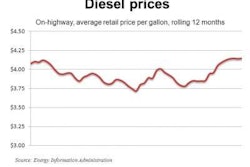A chief financial officer for a trucking company on Wednesday, April 18, warned a Senate subcommittee that rapidly increasing toll rates, as well as the spread of tolls across the transportation system, are a threat to consumers and to the trucking industry.
“I am deeply concerned about the significant increases in toll costs that have been imposed on NFI and other trucking companies over the past few years,” said Steve Grabell, testifying on behalf of the American Trucking Associations during a hearing of the Senate Commerce, Science and Transportation Committee’s Subcommittee on Surface Transportation and Merchant Marine Infrastructure, Safety and Security.
Grabell told the committee’s chairman, Sen. Frank Lautenberg (D-N.J.), and other members that in 2011 alone, the Cherry Hill, N.J., carrier paid $14 million in tolls. “These added costs have forced us to reroute our trucks to less efficient secondary roads, which raises our costs and increases congestion and safety concerns,” he said. “In addition to the impact increased tolls have on logistics providers, the added costs associated with toll increases filter down to the consumer and affect business decisions regarding hiring and facility location and expansion.”
Where toll facilities serve interstate traffic, federal oversight and possible intervention in determining toll rates is necessary and appropriate, Grabell said, urging the committee to support the Commuter Protection Act introduced by Lautenberg to provide federal oversight for toll authorities.
Grabell said the planned increases in tolls on the bridges between New York and New Jersey operated by the Port Authority of New York and New Jersey would increase tolls 163 percent by 2015, to a total of $105 per truck, “nearly three times greater than the country’s next-highest bridge toll. It appears the vast majority of the revenue will be used to benefit seaports and airports and to complete the reconstruction of the World Trade Center office buildings.”
“Congress has an obligation under the Constitution’s Commerce Clause to ensure that interstate travelers, who may not be represented when toll rate setting and spending decisions are made, have a voice in these processes,” Grabell said, adding that ATA believes the Commuter Protection Act “is a significant step toward ensuring better oversight of tolling authorities that serve interstate traffic.”










